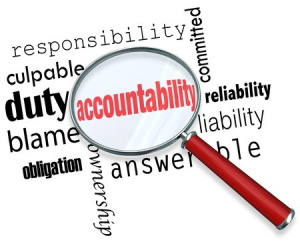How to Build Your Business: Team Accountability
“It is not only what we do, but also what we do not do, for which we are accountable.” – Moliere
 In a recent Harris Poll, 2.5 million people were surveyed on the effectiveness of their organization and their managers. Only 10% felt their organization held them accountable for results.
In a recent Harris Poll, 2.5 million people were surveyed on the effectiveness of their organization and their managers. Only 10% felt their organization held them accountable for results.
Those who manage by accountability also know that accountability is a quality that can be developed, honed through practice, and encouraged in others. Leaders who have a management philosophy of personal accountability also seem naturally to model the qualities of integrity and responsibility for their organization. It’s an easy act to follow for a committed team.
Turn Dysfunction into Building Blocks
In his best-selling book, The Five Dysfunctions of a Team, business consultant and speaker Patrick Lencioni describes the many pitfalls that teams face in their development. This book explains the fundamental causes of organizational politics and team failure.
The five dysfunctions the author highlights are:
- Inattention to Results
- Avoidance of Accountability
- Lack of Commitment
- Fear of Conflict
- Absence of Trust
Lencioni states that these very dysfunctions should be turned around to become the building blocks of the team to achieve results.
If we know trust is the foundation for all teams, and all relationships, we can start from that place. But we still have to be authentic and be willing to talk about the hard stuff when things aren’t going well.
Lencioni says, “The need to avoid interpersonal discomfort prevents team members from holding one another accountable for their behaviors and performance.”
What I think is so vital about Lencioni’s theory is that if we can’t manage conflict, how can we move toward results? What I see happen on many teams is an innate need for the team leader to create affiliation among his or her team members. There is often a perceived conflict that arises when we have to abandon our role as the “nice guy” to be the “bad guy” (the boss) and enforce the rules. And the smaller the team, the more chronic the problem.
I would go so far as to say that avoiding conflict and enforcing accountability is worse than having no accountability measurements in place at all. Does that sound harsh?
Let me give you an example:
Last year I designed and facilitated an off-site planning event for a business team in New Jersey. Following our off-site event, I offered to conduct some follow-up work to assist with the integration of some of the concepts that we introduced at the meeting.
In this business owner’s office, the phones ring off the hook from morning until closing time and throughout the weekend, even when the office is closed. Currently, eight people are on this team. I have visions of them all sprinting through the office some days in reaction to their clients’ needs.
 Since our off-site meeting, I have had approximately six phone calls that were either missed or rescheduled due to last minute “emergencies”. It is chaos in the office. Yes, they are busy and they are writing a lot of new business, but they are in such a frenzied state most days that it’s a wonder to me they don’t collapse at each day’s end.
Since our off-site meeting, I have had approximately six phone calls that were either missed or rescheduled due to last minute “emergencies”. It is chaos in the office. Yes, they are busy and they are writing a lot of new business, but they are in such a frenzied state most days that it’s a wonder to me they don’t collapse at each day’s end.
This client has been difficult to coach. He is losing money due to his inefficiencies. I also recently learned that his office is losing clients to competitors at about the same pace that they are writing new business. In the insurance business, this situation is called a “lapse/cancellation ratio.” It’s vital to keep that ratio as low as possible, meaning to write substantially more new business than you lose, if you are to run an efficient and profitable company.
My work with this team has proven to me yet again the importance of having in place:
- Systems and processes (the business infrastructure)
- Clearly defined roles and responsibilities
- Accountability measures to keep the business on track
Work with Intention:
This business is losing the company money. Its employees are operating in a responsive mode on a daily basis, as opposed to being proactive and working with intention.
Not surprisingly, this team has seen a team member turnover of nearly 100% in the past couple of years. Am I worried about this team’s well being? Of course I am!
The off-site meeting that this business owner invested in was a fun team-building opportunity to get away from the office and play together as well as get to know each other better on a personal level but when the ream leaders do not put accountability measures in place to integrate their work fully, we can predict what will happen when it’s time to evaluate results: Failure.
Lencioni notes that another vital element of the avoidance of accountability is the role of the leader to confront difficult situations. And “without commitment to a clearly defined set of goals, team members will hesitate to call their colleagues on their actions and behaviors that are counterproductive for the team.”
Work together as a team…
 Set your goals as a team. Do it together whenever possible. And honor them. It’s even okay to change the goals when you need to redirect your course, but have them and make sure there are structures in place to remind everyone on a daily basis where the target is. Make sure everyone knows who’s responsible for what and that accountability measurements are in place to track your results regularly.
Set your goals as a team. Do it together whenever possible. And honor them. It’s even okay to change the goals when you need to redirect your course, but have them and make sure there are structures in place to remind everyone on a daily basis where the target is. Make sure everyone knows who’s responsible for what and that accountability measurements are in place to track your results regularly.
Roll up your sleeves and take your team with you. And those who don’t follow you need to find somewhere else to work.
I can help you develop accountability practices in your organization.
Order my book today or contact me at 425-241-4855 to schedule a workshop.